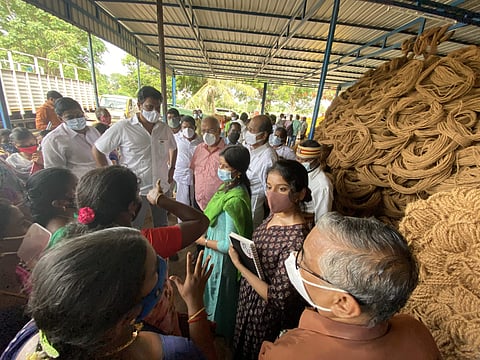

If India resides in its villages, then why is the spotlight not on the rural areas? This fact became more evident during the lockdown. As Thein Manimekalai Sowrirajan reasons, "Rural areas are a source of labour for urbanities, in fact, all the support system of the former rests on the latter," says the 29-year-old. And this rift was even more pronounced during the pandemic. To make rural India the priority again, Nonurban Foundation was started last year by Thein and Nethra Ganesan. "S Anitha scored more marks than me in her class XII and yet, we all know what happened. I come from Thanjavur and understand the importance of access and production. COVID only made it more pronounced," says Thein. Hence, the foundation harnesses the power of 33 youngsters from across the world to help the folk back in the villages to be a little more self-sufficient.
With the power of the internet and technology, and a team that works on the ground for implementation which also includes Thein, the foundation makes work happen. Take for example their work in Anakaputhur, a neighbourhood in Chennai. A cluster of 100 women weave products from banana leaves. The team found them via the World Wide Web and now intend to help in every way possible. "If sustainable fabric needs to move on to the high production stage, it needs upskilling. That's why we are crowdfunding to raise funds for 20 power looms for the women and are even conducting a 26-day workshop, starting September 1, for them," says the PhD student from Politecnico di Milano, Milan.
This is all with the intention of making them self-independent and unlike their previous state, where they were dependent on profit-eating middlemen, each of them gets a bigger piece of the profit pie. With the same zest of working with the primary sector, farming, weavers and so on, they have developed a Framework for Autonomous Investments in Rural areas (FAIR). The agro-based development model encourages investments in rural areas, wherein, the investors, on a contractual basis, get to engage with farming and share production costs and profits. The idea was selected by the international network Friends for Leadership as one of the top scalable sustainable projects last year. But the best news is that they are in talks with the Government of Tamil Nadu to see how far this idea can go. So exciting.
Nonurban Foundation's three-month fellowship comes highly recommended where the fellows will get to experience how to develop and work on a rural development plan. They have a cohort coming up so you better watch out for this one. "A Japanese fellow who aims to become a fundraising manager is now leading the way in our foundation at this front. In this way, we have many individuals from ivy league colleges who are pitching in remotely and sharing their ideas to build a framework that the team on ground is helping implement," explains the urban planner and architect. This young bunch who is connected remotely hopes to set up more chapters so that more and more students can contribute to the countryside.
For more on them check out nonurbanism.com
